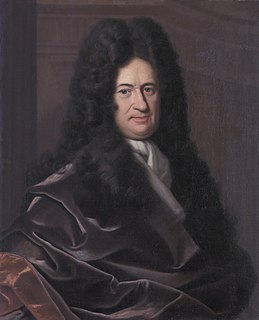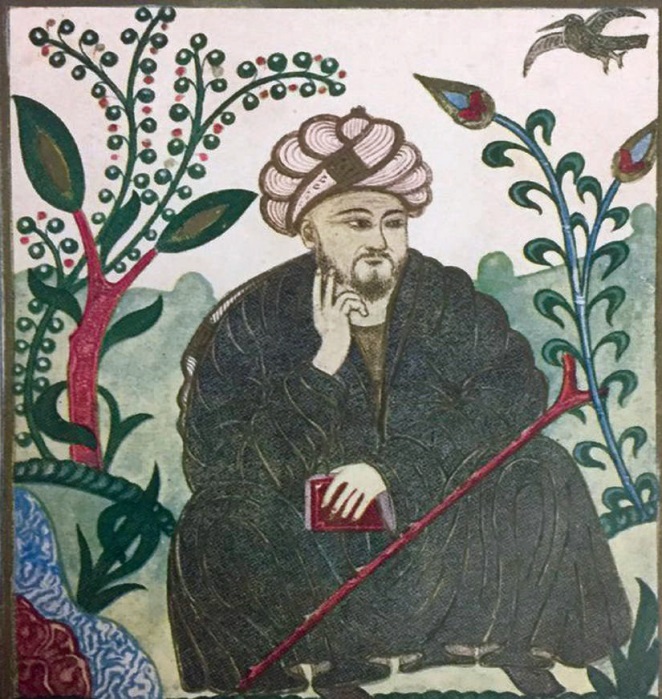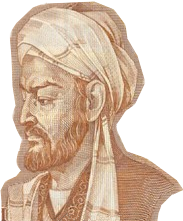
Ibn Sina, also known as Abu Ali Sina, Pur Sina (پورسینا), and often known in the West as Avicenna was a Persian polymath who is regarded as one of the most significant physicians, astronomers, thinkers and writers of the Islamic Golden Age, and the father of early modern medicine. Avicenna is also called "the most influential philosopher of the pre-modern era". He was a Peripatetic philosopher influenced by Aristotelian philosophy. Of the 450 works he is believed to have written, around 240 have survived, including 150 on philosophy and 40 on medicine.
The problem of evil is the question of how to reconcile the existence of evil and suffering with an omnipotent, omnibenevolent, and omniscient God. As the first known presentation by the Greek philosopher Epicurus, as attributed and made popular by David Hume, puts it: "Is God willing to prevent evil, but not able? Then he is not omnipotent. Is he able, but not willing? Then he is malevolent. Is he both able and willing? Then from whence comes evil?"

Theodicy means vindication of God. It is to answer the question of why a good God permits the manifestation of evil, thus resolving the issue of the problem of evil. Some theodicies also address the evidential problem of evil by attempting "to make the existence of an all-knowing, all-powerful and all-good or omnibenevolent God consistent with the existence of evil or suffering in the world." Unlike a defense, which tries to demonstrate that God's existence is logically possible in the light of evil, a theodicy attempts to provide a framework wherein God's existence is also plausible. The German philosopher and mathematician Gottfried Leibniz coined the term "theodicy" in 1710 in his work Théodicée, though various responses to the problem of evil had been previously proposed. The British philosopher John Hick traced the history of moral theodicy in his 1966 work, Evil and the God of Love, identifying three major traditions:
- the Plotinian theodicy, named after Plotinus
- the Augustinian theodicy, which Hick based on the writings of Augustine of Hippo
- the Irenaean theodicy, which Hick developed, based on the thinking of St. Irenaeus
The Book of Healing is a scientific and philosophical encyclopedia written by Abu Ali ibn Sīna (Avicenna) from medieval Persia, near Bukhara in Maverounnahr. Also called The Cure it is intended to "cure" or "heal" ignorance of the soul. Despite its title, it is not concerned with medicine; Avicenna's earlier The Canon of Medicine in 5 volumes had been medical.

Islamic philosophy is a development in philosophy that is characterised by coming from an Islamic tradition. Two terms traditionally used in the Islamic world are sometimes translated as philosophy—falsafa, which refers to philosophy as well as logic, mathematics, and physics; and Kalam, which refers to a rationalist form of Islamic theology.
Early Islamic philosophy or classical Islamic philosophy is a period of intense philosophical development beginning in the 2nd century AH of the Islamic calendar and lasting until the 6th century AH. The period is known as the Islamic Golden Age, and the achievements of this period had a crucial influence in the development of modern philosophy and science. For Renaissance Europe, "Muslim maritime, agricultural, and technological innovations, as well as much East Asian technology via the Muslim world, made their way to western Europe in one of the largest technology transfers in world history.” This period starts with al-Kindi in the 9th century and ends with Averroes at the end of 12th century. The death of Averroes effectively marks the end of a particular discipline of Islamic philosophy usually called the Peripatetic Arabic School, and philosophical activity declined significantly in Western Islamic countries, namely in Islamic Spain and North Africa, though it persisted for much longer in the Eastern countries, in particular Persia and India where several schools of philosophy continued to flourish: Avicennism, Illuminationist philosophy, Mystical philosophy, and Transcendent theosophy.

Abu Nasr Al-Farabi was a renowned early Islamic philosopher and jurist who wrote in the fields of political philosophy, metaphysics, ethics and logic. He was also a scientist, cosmologist, mathematician and music scholar.
Abu'l-Barakāt Hibat Allah ibn Malkā al-Baghdādī was an Islamic philosopher, physician and physicist of Jewish descent from Baghdad, Iraq. Abu'l-Barakāt, an older contemporary of Maimonides, was originally known by his Hebrew birth name Baruch ben Malka and was given the name of Nathanel by his pupil Isaac ben Ezra before his conversion from Judaism to Islam later in his life.
Henry Corbin was a philosopher, theologian, Iranologist and professor of Islamic Studies at the École pratique des hautes études in Paris, France.
Iranian philosophy or Persian philosophy can be traced back as far as to Old Iranian philosophical traditions and thoughts which originated in ancient Indo-Iranian roots and were considerably influenced by Zarathustra's teachings. According to the Oxford Dictionary of Philosophy, the chronology of the subject and science of philosophy starts with the Indo-Iranians, dating this event to 1500 BC. The Oxford dictionary also states, "Zarathustra's philosophy entered to influence Western tradition through Judaism, and therefore on Middle Platonism."
Sufi philosophy includes the schools of thought unique to Sufism, a mystical branch within Islam, also termed as Tasawwuf or Faqr according to its adherents. Sufism and its philosophical traditions may be associated with both Sunni Islam and Shia Islam. It has been suggested that Sufi thought emerged from the Middle East in the eighth century, but adherents are now found around the world. According to Sufism, it is a part of the Islamic teaching that deals with the purification of inner self and is the way which removes all the veils between divine and man. It was around 1000 CE that early Sufi literature, in the form of manuals, treatises, discourses and poetry, became the source of Sufi thinking and meditations. Sufi philosophy, like all other major philosophical traditions, has several sub-branches including metaphysics and cosmology as well as several unique concepts.
History of Islamic Philosophy is a collection of essays by various authorities on Islam in the Routledge series History of World Philosophies and is edited by Seyyed Hossein Nasr of George Washington University and Oliver Leaman of Liverpool John Moores University. The book has been well reviewed.
Nick Trakakis is a philosopher at the Australian Catholic University, where he is Assistant Director of the recently established Centre for Philosophy and Phenomenology of Religion. He has previously taught at Monash University and Deakin University, and during 2006–2007 he was a postdoctoral research fellow at the Centre for Philosophy of Religion at the University of Notre Dame. He works mainly at the intersections of philosophy, religion, and theology.

Philosophy is the study of general and fundamental questions about existence, knowledge, values, reason, mind, and language. Such questions are often posed as problems to be studied or resolved. The term was probably coined by Pythagoras. Philosophical methods include questioning, critical discussion, rational argument, and systematic presentation.
Illuminationist or ishraqi philosophy is a type of Islamic philosophy introduced by Shahab al-Din Suhrawardi in the twelfth century CE.
This is a list of articles in philosophy of religion.
Sharh al-Isharat is a philosophical commentary on Avicenna's book Al-isharat wa al-tanbihat. This commentary has been written by Nasir al-Din al-Tusi in defense of the philosophy of Fakhr Razi.
Al-Isharat wa’l-tanbihat is apparently one of the last books of Avicenna which is written in Arabic.

The Proof of the Truthful is a formal argument for proving the existence of God introduced by the Islamic philosopher Avicenna. Avicenna argued that there must be a "necessary existent", an entity that cannot not exist. The argument says that the entire set of contingent things must have a cause that is not contingent because otherwise it would be included in the set. Furthermore, through a series of arguments, he derived that the necessary existent must have attributes that he identified with God in Islam, including unity, simplicity, immateriality, intellect, power, generosity, and goodness.




